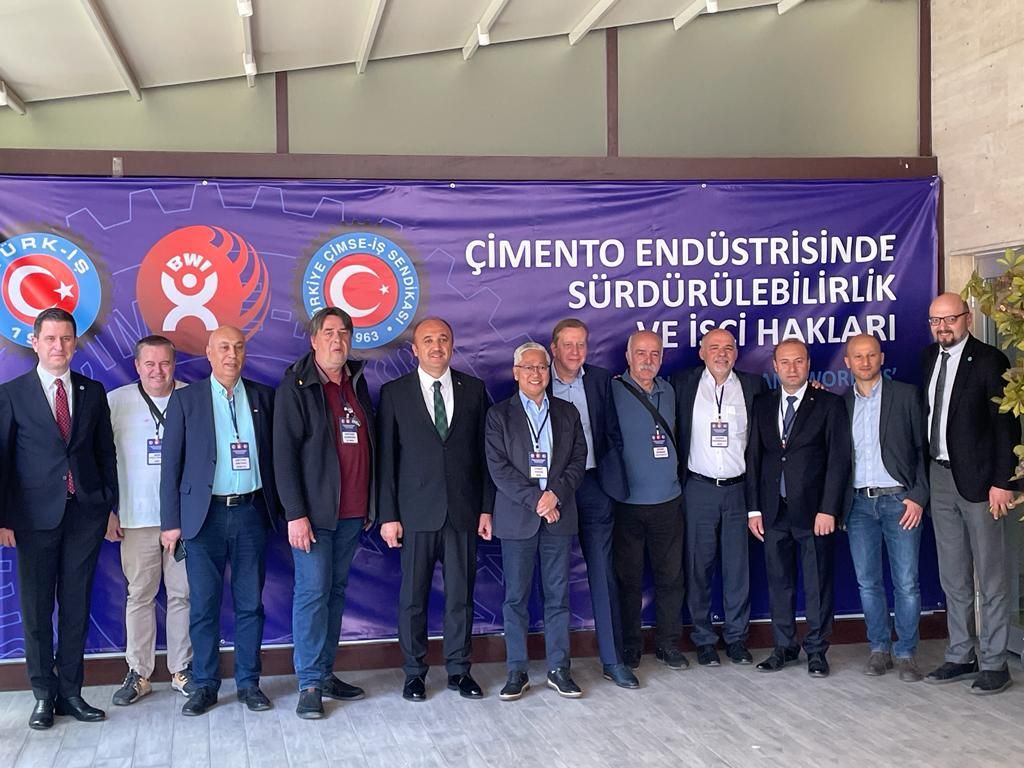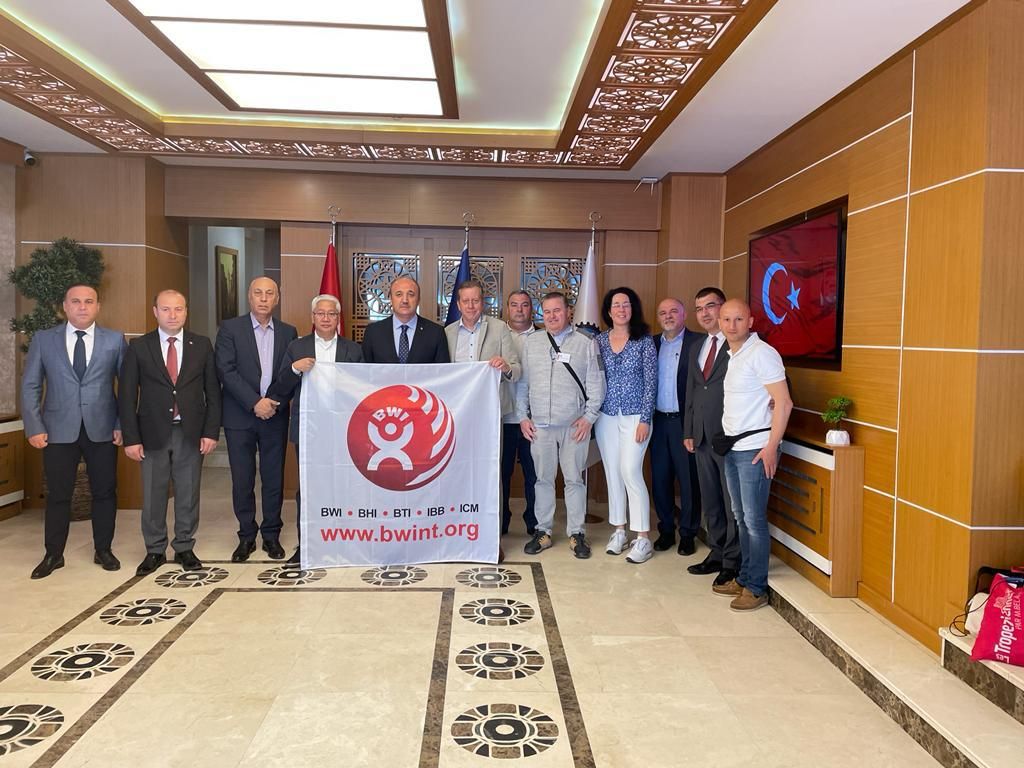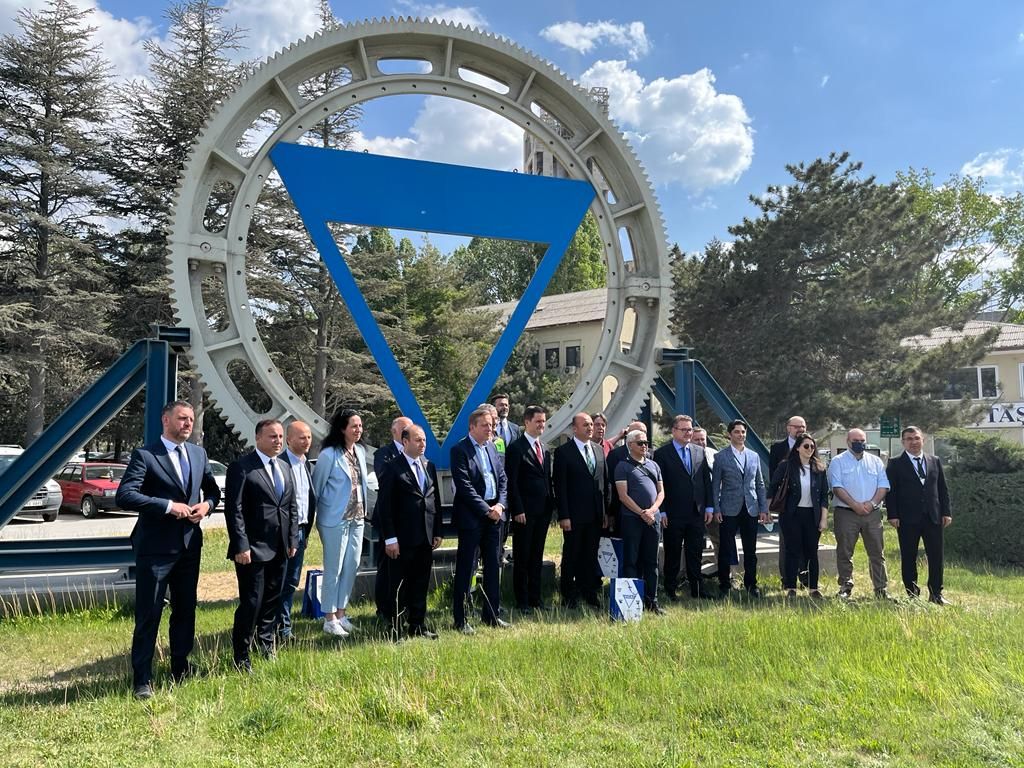BWI holds mission to Turkey, foments greater solidarity and dialogue
 After being postponed last year due to the pandemic, BWI finally carried out a high-level mission to Ankara, Turkey on 24-27 May to promote greater solidarity and dialogue with members of the Cement, Ceramics, Pottery and Glass Industry Workers’ Union (CIMSE-IS).
After being postponed last year due to the pandemic, BWI finally carried out a high-level mission to Ankara, Turkey on 24-27 May to promote greater solidarity and dialogue with members of the Cement, Ceramics, Pottery and Glass Industry Workers’ Union (CIMSE-IS).
The mission was comprised by BWI Deputy President Dietmar Schäfers, Jean-Pascal François and Mathieu Dougoud of the CGT Construction-France, BWI Africa and Middle East Cement Regional Network President Antoun Antoun, BWI Communication Director Geneviève Kalina and BWI Cement and Building Materials Policy Director Jasmin Redžepović.
BWI General Secretary Ambet Yuson, who was also part of the mission, said that it is important for BWI to visit Turkey and extend its solidarity with its affiliated trade unions and their members. “For many years, Turkish trade unions have been facing a difficult political and economic situation that has had serious consequences for unionisation. This was made worse by the pandemic,” Yuson said.
In a roundtable discussion with BWI Turkish affiliates, it was made clear that the country has suffered from economic mismanagement even before the pandemic. Since the second half of November 2021, the currency crisis has sharply worsened, raising the country’s the cost of living and inflation rate. This has greatly affected the construction industry, with the unemployment rate rising due to the decrease in the number of infrastructure projects.
Affiliates reported that those who sought to protest Turkey’s economic downturn and alarming poverty have been badgered by the government. Even the country’s COVID-19 law was used against trade union members. Despite this, BWI affiliates were able to continue their organising work and negotiate collectively to ensure broad coverage of health and safety measures.
 Proof of this, in January of this year, CIMSE-IS secured a 43 percent wage increase for workers at 29 cement companies, including Bastas Cement (the French Vicat), Votorantim Cimentos and Çimentaş (Brazilian), Akçansa (German Heidelberg) and the Turkish Limak present throughout the world.
Proof of this, in January of this year, CIMSE-IS secured a 43 percent wage increase for workers at 29 cement companies, including Bastas Cement (the French Vicat), Votorantim Cimentos and Çimentaş (Brazilian), Akçansa (German Heidelberg) and the Turkish Limak present throughout the world.
Meanwhile, YOL-IS continues to raise awareness on the high number of worker fatalities. It also signed a joint declaration with the Turkish Association of Employers in the Construction Sector recognising occupational health and safety as a fundamental right.
All affiliates also succeeded in organising and negotiating collective bargaining agreements during the height of the pandemic. They also continued holding trainings and social events for trade union members and their families.
“We increased the number of our members, from 13,000 in 2010 to 28,000. We organise not only for the sake of recruiting new members, but also for better working and living conditions, fairer wages, safer workplaces and a strong union structure for workers. We put in high regard the labour of our fellow workers,” ÇIMSE-IS President Zekeriye Nazlım said.
A panel discussion was also organised as part of the BWI mission. Deliberating sustainability and workers’ rights in the cement industry, the event was attended by BWI, CIMSE-IS, the Secretary General and General Secretaries of the Cement Industry Employers' Association (CEIS), the Turkish Soil, Ceramics, Cement and Glass Industry Employers’ Union, the Ceramics, Cement and Glass Industry Employers' Union and the Director of the General Directorate of Occupational Health and Safety of the Ministry of Labor and Social Security.
 It was reported that there are currently 11,200 cement workers in the country, 7,000 of whom are blue color workers. There are 58 integrated cement plants and 12 grinding plants in Turkey, majority of which are owned by Turkish companies that enjoyed a 9.2 percent production increase even at the peak of COVID-19.
It was reported that there are currently 11,200 cement workers in the country, 7,000 of whom are blue color workers. There are 58 integrated cement plants and 12 grinding plants in Turkey, majority of which are owned by Turkish companies that enjoyed a 9.2 percent production increase even at the peak of COVID-19.
However, in January of this year, cement production decreased by 14.5 percent, with domestic sales dropping by 22.2 percent. The only silver lining was cement exports which increased by 13 percent. Both trade unions and employers said that the Turkish cement industry quickly felt the effects of the Ukraine crisis, which tripled the price of cement.
BWI Global Cement and Building Materials Network President Pierre Cuppens remarked that the Turkish cement industry cannot fade to oblivion. “It is essential for Turkey's economy, and pivotal for Europe and the rest of the world. It is essential to address the key issue of health and safety and to ensure secure jobs,” he said.
Cuppens also said that Turkish unions must look closely at the issue of climate change, decarbonisation and digitalisation. “It is important to have consultations on the cement policy on this matter at the global level,” he said.
 CIMSE-IS said that the country has committed to reduce its carbon emissions by 21 percent by 2030 and reach net-zero carbon emissions by 2053. It said that Turkey's energy strategy hopes to diversify its resources as 74 percent of its energy sources are dependent on imports. As such, the union seeks to encourage the production of low clinker cements and alternative raw materials to help begin identifying CO2 emission rates of cement plants.
CIMSE-IS said that the country has committed to reduce its carbon emissions by 21 percent by 2030 and reach net-zero carbon emissions by 2053. It said that Turkey's energy strategy hopes to diversify its resources as 74 percent of its energy sources are dependent on imports. As such, the union seeks to encourage the production of low clinker cements and alternative raw materials to help begin identifying CO2 emission rates of cement plants.
The mission concluded with the BWI leadership congratulating the leadership of ÇIMSE-IS on its achievements in improving its union organisation and unity among its members, implementing of health and safety measures, and concluding a collective bargaining agreement within the cement industry.
The mission was also well received by the managers of the Baştaş Çimento Baskent Cimento Sanayi ve Ticaret AS, a cement plant belonging to the French multinational Vicat. The company appreciated the mission’s effort to promote a climate of genuine dialogue on health and safety, production and constructive relations with trade unions.
